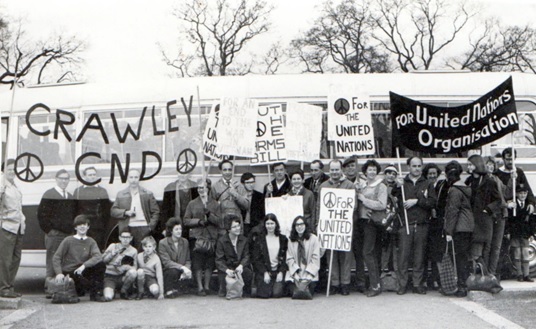My father, Anthony Stoker, was the eleventh child of a devout Catholic Irish immigrant couple living in Southport, Lancashire. He was born in May 1918, but his mother died six months later, during the Spanish Flu pandemic. His father was unable to cope with a new baby as well as his existing large family and so Tony was brought up in relative poverty by various Aunts and Uncles who also had large families of their own to feed. He left school at fourteen, had completed a five-year apprenticeship as a carpenter and joiner by 1938 and was called-up to join the army in 1940. A year later he married his sweetheart, Anne, although aware that she was suffering from tuberculosis, and was unlikely to live for very long. She died August 1942 whilst he was away with the army.
My mother, Elsie Scott, was born in 1921, the only girl in a working-class Tory household in Walworth, South London. She did well at school and was working as a junior civil servant in the newly established Central National Register Office when it was evacuated from London to Birkdale near Southport in 1939. After 1942 she was billeted to live with one of Tony’s sisters-in-law, whose husband was then serving overseas. She met Tony when he came home on leave late in 1943. Despite opposition from some of his sisters who considered Elsie to be a ‘toffee-nosed southerner,’ they married in London 26 May 1945. They were able to do so as Tony had been de-mobbed early as a qualified builder, to help rebuild the bomb-damaged London docks. Whilst serving in the army he had lost his religion and started to take an interest in left-wing politics. This would lead to him joining the UK Communist Party after the War and he remained an active Communist and Trades Unionist until his retirement in the mid-1980s.
The couple found an upstairs flat just off the Old Kent Road; my brother, Ian, was born in August 1946 and I in March 1948. When Ian developed chronic asthma, they realised that they would have to move away from London, ultimately leading to the family arriving in Crawley in November 1951 after my father had spent eighteen months commuting by Greenline bus each day from The Elephant and Castle. They brought with them Elsie’s recently widowed mother.
Tony continued to work for the New Towns Commission on building work in the vicinity of Crawley for several years during which time he became the Treasurer of his Union and the secretary of the local Communist Party. He was not ideally suited to either of these roles as he was dyslexic but no-one else was willing to perform them, and he enlisted the help of my mother to write up the fair copy of the minutes and draft and type any formal correspondence. Tony rather used his skills to devise secret drawers and hidden lockers in the house where we lived so that union funds might be kept safely.
Surveillance
Elsie found a job working as a secretary at the Beehive, the name given to the original terminal at Gatwick Airport. She was never particularly political but accepted (although not always agreed with) her husband’s convictions. She did, however, enjoy organising people and became the secretary of the Northgate Tenants’ Association, which campaigned for additional facilities for the neighbourhood and arranged social activities and summer outings to the seaside for the tenants. It was perhaps this activity which led to her receiving a most unexpected invitation to join a delegation of women from British New Towns to visit the Soviet Union for a month in 1954. (Apparently, someone more distinguished had dropped out at the last moment.) Following the death of Stalin in March 1953 there had been a brief thaw in relations with Britain before the re-emergence of the cold war under Nikita Khruschev. She had to give up her job at Gatwick Airport to accept this invitation but it was a time of full-employment in the town and she was well qualified to find another one.
Thus she visited the Soviet Union in 1954, but found it surprisingly difficult to find a new job on her return to Crawley. On one occasion she had even started work for a new employer, only to be told that her appointment had been ‘a mistake’, and given a week’s pay in lieu of notice. Eventually though, she found a job as a secretary working at Petpro, a factory in Kelvin Way which made catering confectionary and chocolate, where she remained for eight years. When she came to leave her boss told her that he had been visited by a Special Branch officer, the day after she had begun working for him. The policeman had informed him that his new employee had recently visited the USSR and was married to a known communist. He suggested that she should therefore be dismissed. Fortunately, her boss refused to do so as he didn’t consider that a chocolate factory in Crawley held any secrets likely to be of interest to the KGB!
There was no doubt that Special Branch had our family under surveillance. Only one other of Tony’s many siblings and cousins had left-wing sympathies and my uncle Charlie used to post his copy of the local Southport newspaper to my father each week once he had finished reading it, using the reduced ‘printed paper’ postal rate. This was assumed by the authorities to be a sophisticated means of communication between two spies and on several occasions these packages were intercepted and opened prior to their delivery. In fact, they couldn’t have been more wrong. My father was both mild-mannered and loyal to his country, but there was widespread paranoia at the time. Mum would sometimes joke that he was a ‘sheep in wolf’s clothing’. Even my grandmother, whose political sympathies were decidedly right-wing, nevertheless thought the world of her son-in-law until her death in 1964. I cannot say that my father’s politics impacted upon my own career path, but they certainly did so on that of my brother. He had the offer of a prestigious apprenticeship with Redifon in Manor Royal withdrawn at the last moment in the early 1960s once they discovered the identity of his father.
Blacklisting
Although there was plenty of building work available in South East England during the 1950s and 1960s, Tony and several of his friends would find it impossible to get taken on to the big jobs, as their names were on a blacklist of known trades union ‘agitators’ which was maintained by the main building contractors in the area: the information from which was readily shared with any other smaller builders who cared to enquire. Those affected discovered this by making pseudonymous calls pretending to be sub-contractors about to take themselves on. They eventually got over this problem by forming their own company of sub-contractors, the title of which did not include any of the blacklisted names. The new sub-contracting partnership did reasonably well as all those involved were skilled and conscientious tradesmen. However, due to their political beliefs, they refused to profit from anyone else’s labour, thus if they needed another worker to cover an additional trade he would always be taken on as a new partner.
After several years, Tony, who was then in his forties, began suffering from the effects of a peptic ulcer and found it increasingly difficult to keep up with his younger partners at work. He knew that he would not be able to do so for much longer. He therefore looked around for a less stressful, steady job with a small pension. The local Crawley Urban District Council (established in 1956) regularly advertised for qualified and experienced carpenters to undertake maintenance work on their large social housing stock, built by New Towns Commission. However, every time Tony applied for such a post, he was turned down without an interview or any reason given. It was clear that the housing department was using the same informal blacklist as the private builders. After three such applications and refusals, Elsie drafted a letter from Tony asking for the reasons for him having been turned down without interview as his Union wished to take the matter up with the Members of Council at their next meeting. An invitation for him to start work the following Monday came by return of post. Tony remained as a carpenter with Crawley Urban District Council (Crawley Borough Council after 1974) for nearly twenty-five years until his retirement and proved to be one of their most conscientious and reliable employees.
Nuclear Disarmament
My brother and I did not always share my father’s political beliefs, and he never attempted to force them upon us, although we, in common with much of the population, did share his concerns about an imminent nuclear war. We were therefore happy to join my father on the annual four-day protest marches organised by the Campaign for Nuclear Disarmament from the Nuclear Weapons Research Establishment at Aldermaston, near Reading, past the Houses of Parliament to a rally in Trafalgar Square. These took place between 1959 and 1963 and were attended by individuals with many different political persuasions. The Crawley Branch of CND organised daily coach parties for those who could only march for part of the time.
The Aldermaston marches between 1960 and 1962 (which I took part in) were models of peaceful protest, but following the huge public alarm associated with the Cuban Missile Crisis in October 1962 a group of frustrated protesters broke away from the main march in 1963. Calling themselves ‘Spies for Peace’ they attempted to publicize the existence of a secret government fall-out shelter at Warren Row near Maidenhead. This would have become Regional Seat of Government No. 6 in the event of a Nuclear War. This incident, which did not involve members of my family, put an end to the Aldermaston marches and future anti-nuclear demonstrations were one day affairs centred on London.

Crawley CND about to leave for the Aldermaston March, Good Friday 1961. My father is in the back row holding the ‘Cut the Arms Bill’ poster, I am standing to his right.
‘Seditious’ Literature
Ours was one of the few households in Northgate that had the Communist Daily Worker (after April 1966 known as the Morning Star) delivered each morning. Some local newsagents refused to handle the paper while others would only deliver in response to a specific order. My father had a friend, David Hook, who would stand and sell copies of this newspaper in Queen’s Square, Crawley every Saturday. On those occasions that he took a holiday, my father would take his place, somewhat to my embarrassment. As the secretary of the local branch of the Communist Party he was responsible for distributing and receiving subscriptions for several weekly and monthly political publications, which the newsagents in the town would not handle. One such was the Soviet Weekly, followed later by Marxism Today. I do not remember the several other titles he supplied, but I remember he had a weekly paper round to deliver them to all the party members in Crawley.
Town Twinning
Tony was also a part of a group of left-wing activists trying to encourage Crawley to respond favourably to an invitation to twin with Eisenhüttenstadt, a post-war new town in eastern Germany, originally known as Stalinstadt. He was one of the delegates who visited that town in 1961 and our family accommodated a couple from that town on a return visit to Crawley. Despite opposition, the local Labour council decided to proceed with the twinning in 1963, only to have it rescinded once the Conservative Party took control after 1970. I later realised that my father must have crossed Berlin at the time when the wall was being erected. As a thirteen-year-old I did not fully understand the implications of living in a Communist state. That only came later, after reading novels such as The spy who came in from the cold and A day in the life of Ivan Denisovich.
By the mid-sixties my mother and father were largely free of family responsibilities and had the resources to travel more. Annual summer holidays were usually taken in Communist-bloc countries including Yugoslavia, Czechoslovakia, Hungary and even Russia. I sometimes now wonder why I didn’t question my father more closely about his political beliefs and the realities of living under communist regimes, especially after the suppression of the Prague Spring in 1968. However, I was then preparing to go away to college and would need their continuing financial support. By 1970 I had moved away from Crawley for good, only to return for short visits to my parents, and my brother had been offered a job in South Africa where he would remain for thirty years. Crawley began to be a much more ethnically diverse place in the 1970s than it had been in the 1950s and 1960s. This was applauded by my parents, especially after they acquired two grandsons of mixed British and West Indian heritage and two (later three) South African granddaughters. Yet, at the same time, they thought that much of the optimism and idealism that had been such a feature of the residents of Crawley in its early years as a new town was beginning to be lost.
Social Housing
My father was a passionate believer in the importance of good quality social housing for young families, having suffered from the lack of decent accommodation after the war. Indeed, he had spent most of his working life either building or else maintaining such houses. Under the 1980 Housing Act council tenants acquired the right to buy their houses at a substantial discount, based on how long they had lived in them. My mother was keen for them to take advantage of this measure, arguing that they were both on the point of retirement, they had lived frugally and paid rent on the house for thirty years and would be able to buy it outright from their savings. Tony was vehemently against the idea, for political reasons, as he simply did not believe the government assurances that the receipts from the council house sales would be used to replace those which had been sold. He could foresee a future shortage or neglect of the social housing that he and his family had benefitted from. This was the only topic on which my parents had serious arguments during the sixty-one years of their marriage.
Tony held out for several years but while canvassing on behalf of the Labour Party candidate for the June 1983 general election he became depressed with the large number of working-class tenants who declared that they were going to vote Conservative for the first time and buy their houses. Following the re-election of Margaret Thatcher, Tony at last gave way and agreed that he would sign the relevant papers although he wanted nothing more to do with the matter. My mother submitted their application the following day and by the end of 1983 they had purchased the house in Black Dog Walk at 50% of the then market price. This was at a time when property prices in the area were rising. Under the terms of the sale, they had to remain living there for several years, but in 1987 they sold the house and moved back to Southport, where equivalent-sized houses were half the price. Elsie’s mother and her two brothers had died by this time, Ian, his wife and daughters were sill in Durban, and I was living in West Wales, so they no longer had any family ties with Crawley.
The purchase and subsequent sale of their council house and their move back to Lancashire enabled my parents to enjoy a comfortable and secure retirement until their deaths in 2006 and 2007 respectively. Overseas holidays continued including trips to Cuba, and the USA. They even managed to make it to China and Hong Kong to celebrate my second marriage in 2001. My Chinese in-laws were enormously impressed that two octogenarians should have ventured so far. My father also began to revisit the catholic church that he had attended as a child, although this was principally as a means of meeting up with his surviving family members. However, Tony always felt guilty about the purchase and sale of the house in Crawley, although he had only agreed to do so for the sake of his wife. His own children were both financially secure, but he worried that he had contributed to letting down his grandchildren and indeed future generations of newly married couples who would find it far more difficult to find somewhere decent to live.
David Stoker
November 2022



